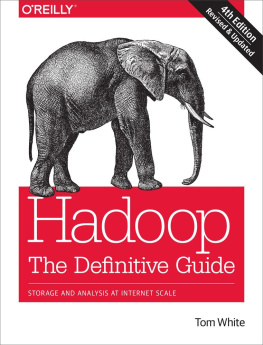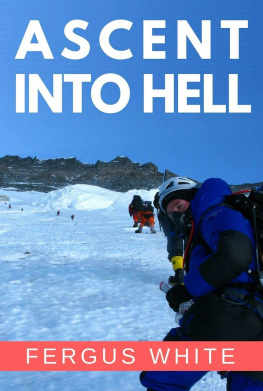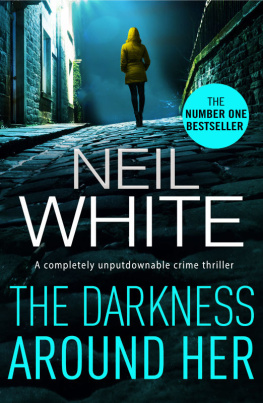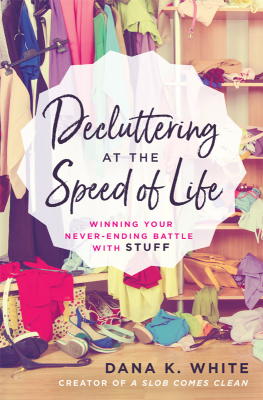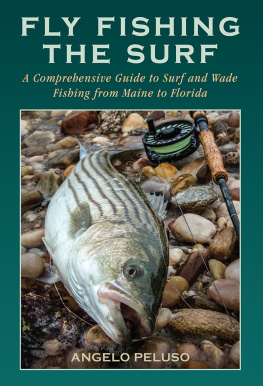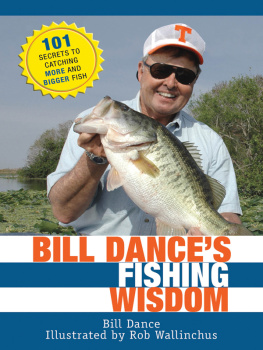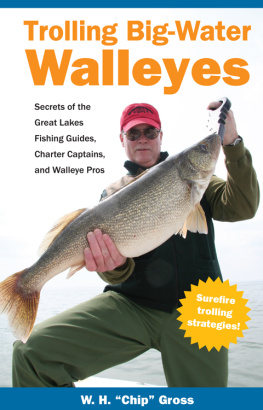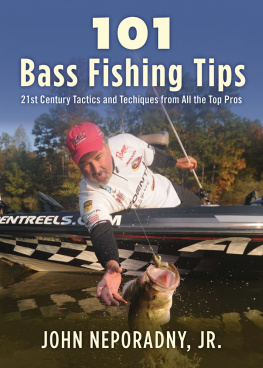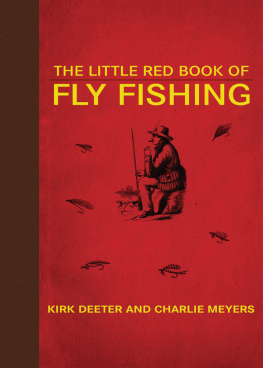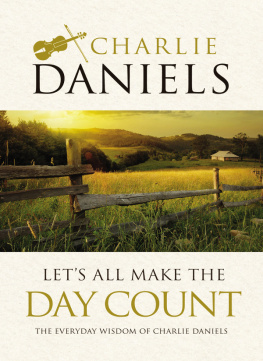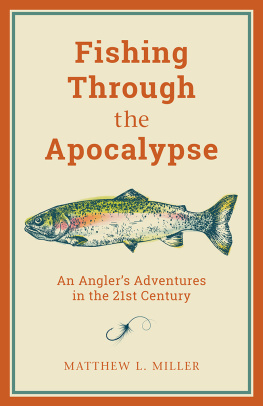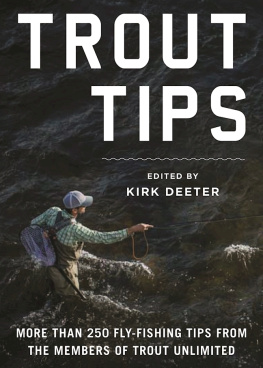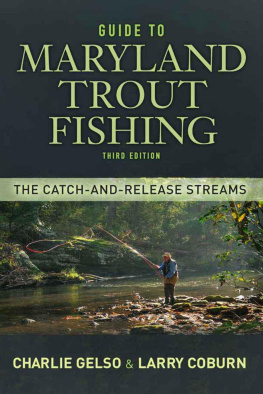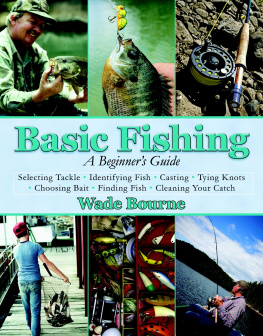Charlie Whites 103 Fishing Secrets
Illustrations by Nelson Dewey

Copyright 1985, 2003 Charles Radcliffe White
All rights reserved. No part of this publication may be reproduced, stored in a retrieval system or transmitted in any form or by any meanselectronic, mechanical, audio recording or otherwisewithout the written permission of the publisher or a photocopying licence from Access Copyright, Toronto, Canada.
Originally published by Heritage House Publishing in 2003 in paperback with
ISBN 978-1-895811-61-9.
This electronic edition was released in 2011.
e-pub ISBN: 978-1-926613-01-7
Cataloguing data available from Library and Archives Canada
Cover design by Darlene Nickull
Cover photo by Peter Sara
Illustrations by Nelson Dewey
Heritage House acknowledges the financial support for its publishing program from the Government of Canada through the Canada Book Fund (CBF), Canada Council for the Arts and the province of British Columbia through the British Columbia Arts Council and the Book Publishing Tax Credit.

www.heritagehouse.ca
CONTENTS
Chapter One
GENERAL CONSIDERATIONS
Chapter Two
PREPARING FOR A FISHING TRIP
Chapter Three
FINDING THE FISH
Chapter Four
BETWEEN YOU AND THE BOTTOM
Chapter Five
TROLLING TECHNIQUES
Chapter Six
FISHING WITH BAIT
Chapter Seven
MATURE SALMON IN RIVER-MOUTH AREAS
Chapter Eight
STRIKING, PLAYING, AND LANDING A FISH
Chapter Nine
CONCLUSIONS
Chapter Ten
FUTURE PLANS
DEDICATION
I dedicate this book to my mother, who has supported and encouraged my interest in fishing and wildlife since my fishing fever began when I was five years old. She tolerated my 3 a.m. departures for the local pond, the messy basement washtubs in which I cleaned the catch, and even the hooks and worms left in my pockets.
ACKNOWLEDGEMENTS
Everyone who taught me something about fishingand that includes all my fishing partnersdeserves my thanks, because I learn something on every fishing trip. Special thanks to Rhys Davis, Charlie Guiguet, and Lee and Patty Hallberg, who showed me the basics of salmon fishing.
Thanks also to those who helped develop the underwater TV system that revealed so much about salmon behaviour: Allan Hook, Roger and Tony Rose, Nick Dominique, Laraine Frances, Mike Shack, Bruce Colegrave, Jack Lugg, my sons Chad, Kevin, and David, and the gang at Sony.
I also acknowledge those who did so much in preparation of this bookNelson Dewey, Sally Constable, Tim Cyr, Rex Armstead, Mary S. Aikins, and the staff at Special Interest Publications.
Special thanks to my beautiful and dedicated wife, Darlene, who supports me in everything I do. She (and my son David) nursed me back to health after a devastating stroke left me partially paralyzed in 1999.
Charlie White
INTRODUCTION
Websters Dictionary has many definitions of the word secret, the most prominent being kept from knowledge or view, something kept hidden or unexplained. Anotherrevealed only to the initiatedis more appropriate in this instance, as much of the information in this book is already known to experienced and so-called expert anglers.
This book is a compilation of the tips and secrets I learned from experts when I first started fishing; the knowledge I have acquired from my own fishing experiences; and, especially, the things I have learned and continue to learn from my research with an underwater television camera.

Boyhood experiences
I have been fishing for more than 70 years, having started with a bobber and worm in the ponds and streams of Pennsylvania and Ohio when I was six years old. For the next twenty years I fished enthusiastically for carp, catfish, sunfish, blue gills, creek suckers, chubs, rock bass, walleye, pike, and perch. I even had the occasional battle with smallmouth and largemouth bass.
On several occasions I travelled to Ontario for some exciting fishing for larger bass, great northern pike, and deep-running lake trout. During a stint with the U. S. Navy, I fished for cod off Nova Scotia.

Life-cycle studies
In those days, fishing was the most intense of a number of personal hobbies, but it became the core of my life after I moved to the west coast in 1948. I became obsessed with salmon fishing, ultimately spending two years with the Oregon Fish Commission as a biologist-photographer. I fin-clipped young salmon in hatcheries and then followed them through their entire life cycles. I learned a great deal from the other biologists, who were also keen anglers in their spare time.

After moving to Vancouver Island, British Columbia, in 1956, fishing became even more important to me. I had moved to Victoria primarily to build and operate a television station, but there is no doubt that my move was strongly influenced by the good fishing nearby.
Fishing guide
When the station was completed, I moved full-time into fishing projects. I operated a fishing charter business during the summer and designed marine products (crab traps, sinkers, and bait boxes) during the off-season.
Being a guide was not the easygoing occupation I thought it would be. In fact, it can entail more pressure than that experienced by most business executives. Yet I quickly established a reputation for consistent success using light tackle (much sport fishing in those days was done with heavy wire lines and cannon balls) and attracted many executive parties from such places as Victorias Empress Hotel and through the tourist bureau.

Some groups would fly in by private jet, rush by taxi to the marina, and we would be off to the fishing grounds. If we didnt have a fish in the boat within the first 30 minutes, some of the high-powered execs would begin tapping their feet on the deck and drumming their fingers on the arms of their seats. Not a word was spoken (usually), but I knew they were thinking, Well, Mr. Expert, wheres the fish? Mercifully, the fishing was usually pretty good, and I had developed some quite successful strategies, which I will explain later in the book. There were, however, too many occasions when the fishing was really tough, and my tension level soared as I scrambled to get that first fish on board.
There are no relaxing days on the water. The customer doesnt really care about the big catch you made last week, or the exciting run of giant salmon due at the end of the month. He wants fish in the box today!
All of this activity was a far cry from my formal education: I had obtained a degree in civil engineering from Cornell University in New York state, and then practised engineering for two years prior to moving to the west coast. This training gave me the necessary background to develop an exciting new project. This project was conceived while talking with charter guests who regularly expressed great curiosity not only about salmon, but about all marine life and the underwater environment.



